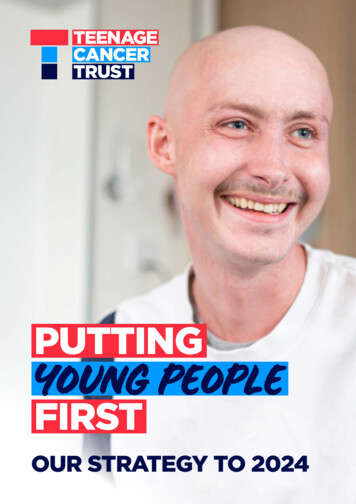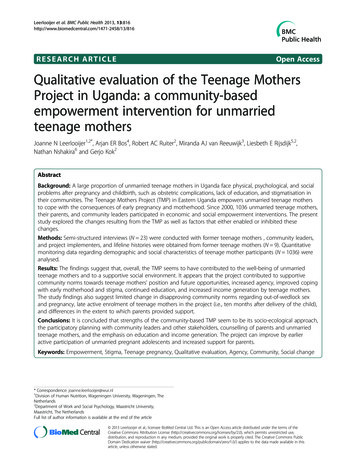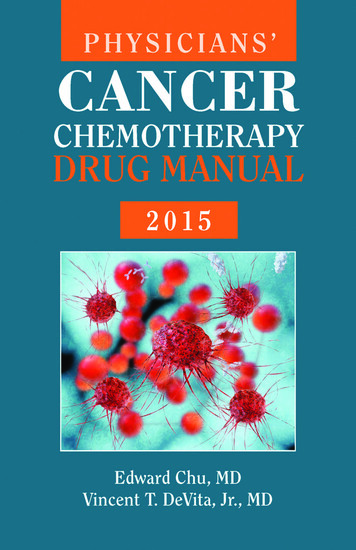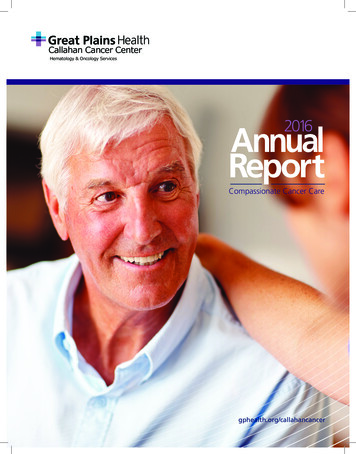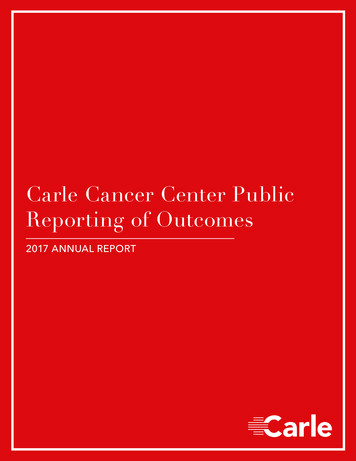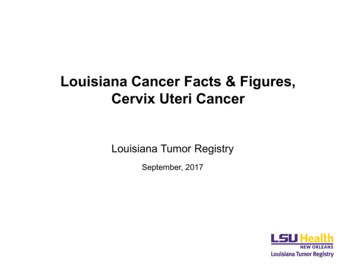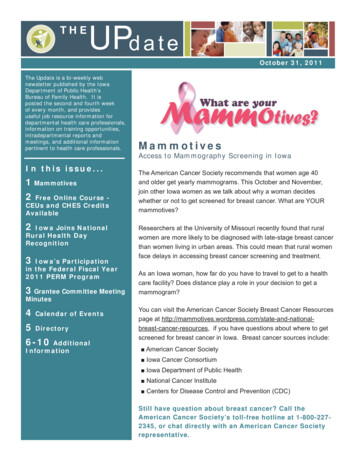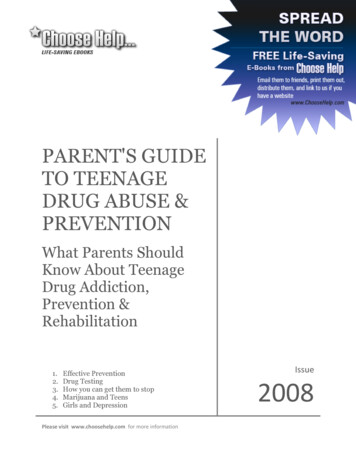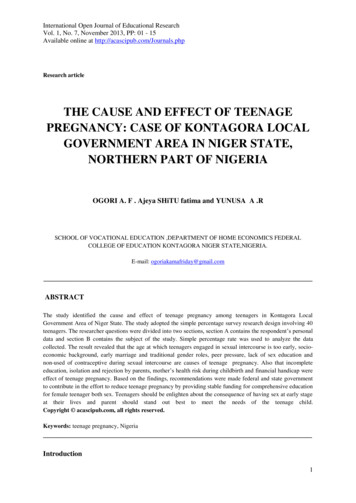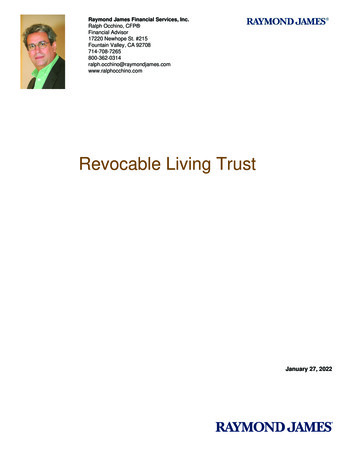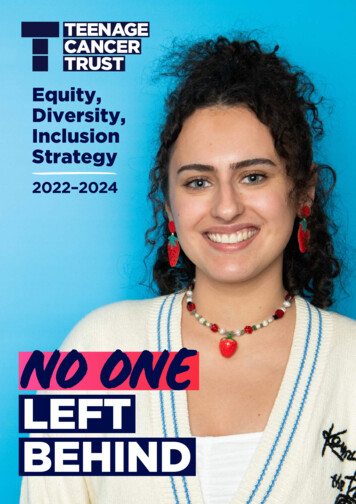
Transcription
Equity,Diversity,InclusionStrategy2022–2024NO ONELEFTBEHIND
WELCOMETeenagers and young adults areunique – as individuals and as anage group. It was the shockinginjustice of them being forgottenand overlooked by a system thateither saw them as “big children”or “small adults” that was thecatalyst for the creation ofTeenage Cancer Trust morethan three decades ago.Before we started, young people were designedout of existence by a system that didn’t includethem and didn’t understand – or meet – theirunique needs as they face, and recoverfrom, cancer.Celebrating the difference in young people,individually and as a group, is essential to allwe do and we are delighted to share this – ourfirst Equity, Diversity and Inclusion Strategy.That fact that this is our first Equity, Diversityand Inclusion Strategy tells you that althoughinclusion of young people is why we came intobeing, we have a long way to go before we aretruly equitable and are able to fully support,reflect and celebrate the rich diversity amongstall young people with cancer in the UK.That’s why we are committed to acknowledgingand tackling societal injustices and prioritisingequity as a central part of our organisationalstrategy.Equity, Diversity and Inclusion need to beat the heart of our decision making and notan after-thought or add-on. This won’t beeasy. We need to work collaboratively withour partners.We need to listen and learn; have challengingconversations; take tough decisions and – nodoubt – get some things wrong. But we willbecome comfortable with that discomfort,grounding ourselves in our values and alwaysmaking sure we come back to doing what’sright for young people.Since 2020 we have taken great steps forward.Earlier in 2022, we published our Statementof our Intent. Now, this Strategy solidifies ourcommitment, provides a detailed roadmap formore progress and bringing about change. Thisis about action, not words. We all have a part toplay in this and we’re all committed to being heldaccountable for our progress – and our mistakesand our learnings.Together we can – and will – makesure that no young person withcancer is left behind.Zainab Al-FarabiEquity, Diversity& Inclusion LeadKate CollinsChief Executive
WHY ARE WE FOCUSING ONEQUITY, DIVERSITY & INCLUSION?Equity, Diversity &Inclusion is central andcrucial to achieving ourpurpose as a charity.What this means now is that to deliverour purpose fully we must change.You can read our EDI statement here.HOW DOES THIS FIT IN WITH OURORGANISATIONAL STRATEGY?Our EDI strategyis closely linked toour organisationalstrategic objectives:1. Focus on Equity2. Provide the best care and support 3. Tackle the isolation of cancer4. Leading the wayYou can read our full organisationalstrategy here.
1. Data 101WHAT ARE WE– Plug the gapFOCUSSING ONWe need to plug the diversity data gapsFOR 2022–2024?we have across all levels, from our colleaguesORGANISATIONAL including frontline colleagues, volunteers,applicants, fundraisers, supporters, donors,STRATEGY?trustees and crucially, for the young peoplewe serve.As well as this, we will build trust and createsafe spaces with regular feedback opportunities.It is important to us that people can share theirexperiences (good and bad) and thoughts onour EDI and wider work as a charity.This quantitative and qualitative data will underpinall of our work allowing us to understand wherewe are and where we need to be to reduceexisting inequalities and support all young peoplewith cancer in the UK.
“It is important forTeenage Cancer Trustto set a positive examplefor young people sothey feel safe and secureand that we have theirbest interests at heartwithout them feelinglike they are treateddifferently becauseof their background.”Youth Support Coordinator2. Our PeopleWe will support our EDI Working Group towork alongside the EDI Lead, senior leadershipteam and trustees, to facilitate and oversee thedelivery of our EDI action plan. Our leadershipteam will develop their understanding of inclusiveleadership and decision-making and feel wellinformed and empowered to be visible and activein this space. We will build upon the targetedEDI leadership training that was delivered in2021 to enable them to do this and will continueto support their training needs and development.EducationWe know that for an internal culture shift tohappen, we have to change hearts and minds.We will do this through training and educatingour colleagues, including frontline colleagues andvolunteers on different people’s lived experiencesrecognising intersectional experiences withinthis. We will also upskill them on EDI issues andconsiderations and how it applies to their dayto-day work. We will continue to facilitate EDI‘drop in’ sessions, watch parties and build uponthe EDI training sessions that were delivered tocolleagues in 2021.DevelopmentIt is important to us that our colleagues feelfree to be themselves and that while doing this,they feel valued and are rightly recognised fortheir talents and contributions. We will createclear progressions routes and developmentopportunities for underrepresented groups sothey can not only be themselves but thrivedoing so.Recruitment and other people processesFrom the data we do have, we know that ourcolleagues demographic does not reflect all thecommunities we serve and aim to serve. Wewill collect diversity data from applicants,review our recruitment practices and provideresources and tailored training to those withrecruitment responsibilities.For this work to be sustainable, we will also reviewour employee lifecycle systems and practices fromthe point of attracting applicants through to ourappraisal and exit interview processes.
3. Our Services forYoung PeopleCentral to our organisational strategy is ourfocus on Equity, reducing existing inequalitiesand making our services accessible to all youngpeople with cancer, with no-one left behind.Diversity data collection, feedback fromunderrepresented groups will be a priority. Inthe interim, we will look at existing researchof historically marginalised groups withinthe heath and charity sectors and work withthe necessary stakeholders to address anychallenges and remove existing barriers toour services.As well as educating frontline colleagues on EDIissues and lived experiences, we will look at howwe can better support frontline colleagues whoare from marginalised communities. We alsowant to adopt a consistent approach and provideresources to better enable frontline colleaguesacross our units to both support and celebrateyoung people from underrepresented groupswho may face unique challenges during theirexperience with cancer.Our longer-term goal is to carry out research intocurrent inequalities to shape our services as anorganisation and our future strategies. We willmake sure our Youth Advisory Group is diverseand representative and that our events (suchas Find Your Sense of Tumour) and platformsfor young people (such as IAM) are safe andinclusive for all and celebrate a range of identities.“Every person deservesequal access to goodcare. Young people withcancer need clinical andpsychological supportto help them througha cancer diagnosis,and no young person’sidentity should be usedto diminish their accessto good care.”Young person
4. Our Marketingand CommunicationsWe want to truly represent all the communitieswe aim to serve. We will focus on the inclusivityof our marketing and communication campaigns,ensuring they are accessible and share a rangeof young people’s experiences with cancer fromunderrepresented groups. We appreciate therisks attached to this and will do all we can, to dothis meaningfully and respectfully, avoiding atokenistic approach.To help us do this authentically, we will celebrateand commemorate a range of EDI dates in thecalendar annually. We will create a CreativeCampaigns group of young people to help shapeour creative content and in line with our EDIcommitment, we will make sure that this group isdiverse and representative of the communities weaim to serve.We will upskill our teams in this area throughtraining and toolkit resources. We will embed EDIquestions into project planning, team meetings andappraisals to ensure everyone actively considersEDI into their day-to-day roles and thinking.“Celebrating differencesis the only real wayfor social change tohappen. Only whenwe acknowledge andvalidate the whole ofsomeone’s experienceand identity can we havean understanding of whatneeds to be made betterand how.”Colleague
5. Our FundraisingWe will be carrying out a review of all ourfundraising activity, ranging from the inclusivityof our activity and our events, who we partnerwith, our ethical policy, the diversity and rangeof our supporters and ambassadors and how weengage with different communities.This will include data collection of our own teamsbut also research into understanding supporterexperiences, identifying gaps and opportunitiesto work with underrepresented communities. Inthe interim we will work with existing researchin the sector such as that pointing to theunderrepresentation of fundraisers who arepeople of colour and/or who live with a disability.We will also aim to upskill our teams throughtraining, toolkit resources and embedding EDIquestions into project planning, team meetingsand appraisals.
HOW WILL WE HOLD OURSELVESACCOUNTABLE AND MEASUREOUR SUCCESS? Clear strategic EDI objectives throughour detailed EDI plan, in line with ourorganisational strategy Reporting to our EDI Working Group,Youth Advisory Group and Board oftrustees bi-annually Data collection, monitoring and analysis(quantitative and qualitative) from a rangeof stakeholders including young people, theirfamilies, volunteers, supporters, our colleagues Reporting externally annually first externalreport in December 2022 Analysing and benchmarking against sectorWHO WAS INVOLVED ANDCONSULTED IN THE CREATIONOF THIS STRATEGY?This strategy is the product of conversations andinput over the last two years with: Teenage Cancer Trust’s Youth Advisory Groupswith lived experience of cancer and our services A range of colleagues at Teenage Cancer Trustincluding:– EDI Working Group made up of colleaguesacross Directorates– Equity, Diversity & Inclusion Lead and Headof Culture, Talent & Inclusion– Leadership Team– Frontline colleagues– Board of TrusteesOur EDI strategy supports our widerorganisational strategy and its focus on equityand making sure that our services accessibleto all young people with cancer, with no-oneleft behind.This process is a journey, and we have a lotof learning to do. We would love to hear yourthoughts on our EDI work and anything youthink we should consider.Please rg
teenagecancertrust.org
1. Data 101 - Plug the gap We need to plug the diversity data gaps we have across all levels, from our colleagues including frontline colleagues, volunteers, applicants, fundraisers, supporters, donors, trustees and crucially, for the young people we serve. As well as this, we will build trust and create
